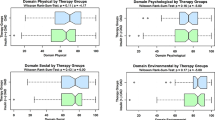Abstract
Objective:
The study objective was to evaluate and compare quality-of-life (QOL) parameters between patients with type 2 (non-insulin-dependent) diabetes mellitus who changed therapy from an oral hypoglycaemic agent (OHA) to insulin and those who remained on an OHA.
Design:
The World Health Organization Quality of Life Questionnaire (WHOQOL) was used to assess quality of life among 2 groups of patients with type 2 diabetes mellitus at baseline and after a 2-month follow-up period.
Setting:
The study was conducted in the outpatient department of the Vuk Vrhovac Clinic, a referral centre for registration, treatment and follow-up of patients with diabetes mellitus in Zagreb, Croatia.
Participants and Interventions:
32 consecutively recruited patients with type 2 diabetes mellitus who were switched from an OHA to insulin therapy (group 1) were compared with 28 patients who remained on OHA (group 2) with respect to QOL issues. The patient groups were comparable in terms of gender, age, duration of disease, education and family status. However, patients in group 1 had glycosylated haemoglobin (HbA1c) values greater than 9.5% on average during a period of approximately 6 months, which was the criterion used for switching to insulin therapy.
Main Outcome Measures and Results:
At baseline, various QOL ratings were higher among patients in group 2 than group 1, indicating better quality of life with respect to overall quality of life (t = −2.31, p = 0.03), physical health (t = −2.36, p = 0.02), psychological state (t = −2.01, p = 0.05) and level of independence (t = −2.75, p = 0.001), while no differences were found between groups with respect to the social domain, personal beliefs and environmental QOL aspects. After the follow-up period, the groups were comparable in all QOL aspects other than overall quality of life (t = −2.18, p = 0.03) and level of independence (t = −3.49, p = 0.001), both of which remained higher for patients in group 2. No changes in QOL parameters were detected within group 2 from baseline to the end of the 2-month follow-up period, whereas patients in group 1 showed significant improvement in psychological QOL determinants (t = −2.14, p = 0.04).
Conclusion:
Results of the study indicate that introducing insulin therapy in patients with type 2 diabetes mellitus and sustained elevated HbA1c levels might positively affect their quality of life.
Similar content being viewed by others
References
Jenkinson C. Measuring health and medical outcomes: an overview. In: Jenkinson C, editor. Measuring health and medical outcomes. London: UCL Press, 1994: 1–6
Bradley C. Diabetes Treatment Satisfaction Questionnaire (DTSQ). In: Bradley C, editor. Handbook of psychology and diabetes: a guide to psychological measurement in diabetes research and practice. Chur, Switzerland: Harwood Academic, 1994: 111–32
Bradley C. The Well-being Questionnaire. In: Bradley C, editor. Handbook of psychology and diabetes: a guide to psychological measurement in diabetes research and practice. Chur, Switzerland: Harwood Academic, 1994: 89–109
Hanestad BR, Polit RN. Perceived quality of life in a study of people with insulin-dependent diabetes mellitus using Hornquist’s model. Qual Life Res 1994; 3; 79–85
Bradley C. Measuring quality of life in diabetes. In: Marshall SM, Home PD, Rizza RA, editors. The diabetes annual/10. Amsterdam: Elsevier Science, 1996: 207–24
Jacobson MA, De Groot M. The evaluation of two measures of quality of life in patients with type I and type II diabetes. Diabetes Care 1994; 4: 267–74
Jacobson AM, The Diabetes Control and Complications Trial (DCCT) Research Group. The diabetes quality of life measure. In: Bradley C, editor. Handbook of psychology and diabetes: a guide to psychological measurement in diabetes research and practice. Chur, Switzerland: Harwood Academic, 1994: 65–88
Zigmond AS, Snaith RP. The hospital anxiety and depression scale. Acta Psychiatr Scand 1983; 67: 361–70
Bradley C, Lewis KS. Measures of psychological well-being and treatment satisfaction developed from the responses of people with tablet treated diabetes. Diabet Med 1990; 7: 445–51
Cox DJ, Frederick L. Major developments in behavioral diabetes research. J Consult Clin Psychol 1992; 60: 628–38
Mayou R, Bryant B, Turner R. Quality of life in non-insulin dependent diabetes and a comparison with insulin-dependent diabetes. J Psychosom Res 1990; 34: 1–11
Elgrably F, Costagliola D, Chwalow AJ, et al. Initiation of insulin treatment after 70 years of age: patient status 2 years later. Diabet Med 1991; 8: 773–7
The World Health Organization Quality of Life (WHOQOL) Group. Development of the WHOQOL: rationale and current status. Int J Ment Health 1994; 23: 24–56
Szabo S, World Health Organization Quality of Life (WHOQOL) Group. The World Health Organisation Quality of Life Assessment Instrument. In: Spilker B, editor. Quality of life and pharmacoeconomics in clinical trials. Philadelphia: Lippincot Raven, 1996: 355–63
Lemeshow S, Hosmer DW. Sample size for continuous response variables. In: Lemeshow S, Hosmer DW, Klar J, et al., editors. Adequacy of sample size in health studies. Chichester: John Willey & Sons, 1990: 38–40
Wikblad K, Leksell J, Wibel L. Health related quality of life in relation to metabolic control in patients with type 1 diabetes [abstract]. Patient Educ Couns 1994; 23 Suppl. 1: S1
Wikblad K, Leksell J, Wibel L. Health-related quality of life in relation to metabolic control and late complications in patients with insulin dependent diabetes mellitus. Qual Life Res 1996; 5: 123–30
Jenkinson C. Quality of life measurement: does it have a place in routine clinical assessment? J Psychosom Res 1994; 38: 377–81
Ratzmann KP. The psychological aspects of diabetics with the secondary failure of sulfonylurea therapy. Dtsch Med Wochenschr 1991; 116: 87–90
Author information
Authors and Affiliations
Rights and permissions
About this article
Cite this article
Pibernik-Okanović, M., Szabo, S. & Metelko, Ž. Quality of Life Following a Change in Therapy for Diabetes Mellitus. Pharmacoeconomics 14, 201–207 (1998). https://doi.org/10.2165/00019053-199814020-00008
Published:
Issue Date:
DOI: https://doi.org/10.2165/00019053-199814020-00008




